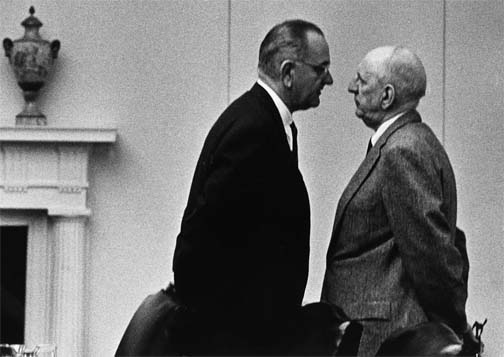The Atlanta Federal Courthouse Should Retain its Name as The Russell Building
 I have read two editorials in the Fulton Daily Report in the last week or so. The first was written by a Federal Defender who believes that the building should not be named after former Georgia Senator Richard B. Russell because of his legacy in support of segregation. The second was a response by former Georgia Senator Max Cleland. He defended Senator Russell’s legacy and argued that we should not judge Senator Russell’s views by our more evolved views on segregation.
I have read two editorials in the Fulton Daily Report in the last week or so. The first was written by a Federal Defender who believes that the building should not be named after former Georgia Senator Richard B. Russell because of his legacy in support of segregation. The second was a response by former Georgia Senator Max Cleland. He defended Senator Russell’s legacy and argued that we should not judge Senator Russell’s views by our more evolved views on segregation.
The Federal courthouse in Atlanta is one of many public works bearing the name of Richard B. Russell. A US Senate Office Building bears his name. Several dorms and other buildings at colleges in Georgia are named after him, as are several schools, roads, lakes, dams, and an airport. Senator Russell’s legacy is more than one of racism. His was a life of achievement and public service in several areas. I knew little about him until I read and became fascinated with Robert Caro’s volumes of biography about Lyndon Johnson. After finishing a book on Robert Moses, Caro has devoted his life and career to telling the story of LBJ. He’s still not finished. That story contains many biographies with the biography, Senator Russell’s being one of them. Caro tells the story of Senator Russell so well that I came away feeling a sense of connection to him. Many of my friends and colleagues who are fans of Caro came away with a similar feeling. Senator Russell created the school lunch program and was a saving figure in his leadership over the committee that investigated the firing of General Douglas MacArthur (the importance of what he did in that episode is beyond the scope of this post). He had a distinguished career in the Senate. He was instrumental as a new dealer as a young governor of Georgia. To read Caro is to get a sense of the man. The Senate he dominated was a vibrant and strong institution. Personally, he was a life-long bachelor who never amassed great wealth in his years of public service. He also was a man of Georgia and carried proudly a family name with a father who was also an accomplished public servant.
So, to the issue at hand, I actually disagree with the Federal Defender who advocates removing Senator Russell’s name from the Federal Building AND Senator Cleland. It is perfectly appropriate to judge Senator Russell for his stance on race and segregation. By any contemporary standard, Senator Russell’s views are shocking and disturbing. And even by the standards of his times, his views were out of touch with the majority. He was a master of the minutiae of Senate Rules — particularly the filibuster. And he used those rules, along with the Southern bloc of Senators, to defeat integration when the will of the majority of senators was to end it. He deserves to be judged for those actions. It is not enough to excuse such views as those of a “man of his times.” He was out of touch even with the time in which he lived on the issue of race. So, I disagree with Senator Cleland on his main argument.
However, I also disagree with the idea that his name should be removed from the Federal Building or any of the places that bear his name. He achieved much. His legacy as a Senator and a Georgian are worthy of remembrance into the future. Generations to come should know who he is and what he did. Those who might be prompted to learn who he is from seeing his name on buildings, schools, roads, lakes, and other public works should also come to learn of his racism and how he bent the rules of the Senate to block integration. To erase his name from the historical record is to deny even the chance of a discussion of who he was, for good or for bad. Georgia’s history, maybe even its present, is not the best on issues of race. But it is important to keep our historical figures in sight and in mind and even on the names of buildings, if for no other reason to learn about them and to engage in dialogue about them. There is a danger in the loss of dialogue about who we were — we lose sight of who we are and can be in the process.

Leave a Reply
Want to join the discussion?Feel free to contribute!